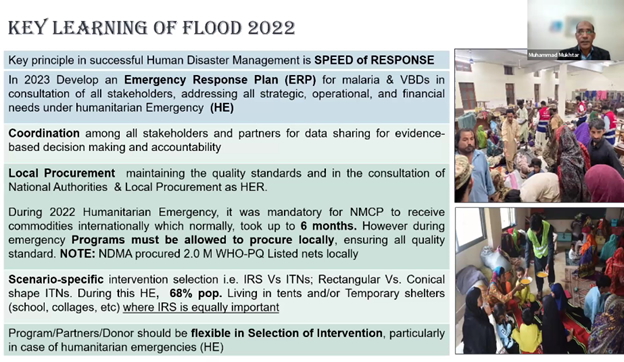The Asia Pacific Malaria Elimination Network (APMEN) Vector Control Working Group (VCWG) held its annual conference from 2-4 December virtually. This year’s theme: “Targeting Priority Issues for Malaria Elimination” provided a topical opportunity to explore some of the challenges faced in the fight against malaria, including the growing impact of climate change on malaria transmission and control.
A recording of the virtual session “Climate and Environment Factors in Sustaining Malaria Elimination” at the 2024 APMEN VCWG Annual Conference
As Co-Chair of the VCWG, I had the pleasure of speaking on day 3 of the conference, which focused on “Climate and Environment Factors in Sustaining Malaria Elimination”. The effects of climate change on malaria transmission are becoming increasingly evident, particularly in vulnerable regions such as South and Southeast Asia. The 2022 floods in Pakistan provided a grim case study of how climate-induced disasters can exacerbate malaria risks. Test positivity rates (TPRs) in the aftermath of the floods reached almost 40% in the most affected areas, driven by displacement and stagnant water that created ideal conditions for malaria-transmitting mosquitoes to thrive.
Climate change is also altering vector dynamics, with mosquito species such as Anopheles pulcherrimus gaining ground in areas where they were previously not as prevalent, introducing new complexities for surveillance and control. These challenges illustrate why climate adaptation must become integral to malaria elimination programs.

During the session, I shared my first-hand experience with the catastrophic Pakistan floods and the key lessons we learnt in the context of our malaria elimination work. The floods revealed critical gaps in emergency response and resource coordination. They taught us that adopting scenario-specific interventions – such as insecticide-treated nets (ITNs), indoor-residual spraying (IRS) and conical nets – and enhancing data-driven decision-making through integrated platforms are key to strengthening future malaria elimination efforts.
My fellow panellists also shared critical insights and innovative strategies for tackling malaria in the face of climate change, focusing on current initiatives and case studies that could inform future efforts.
Mrigendra Pal Singh, Foundation for Disease Elimination and Control of India, showcased the success of combining Integrated Vector Management (IVM) with climate adaptation strategies in India’s tribal districts. His presentation highlighted the importance of community engagement and capacity-building to address seasonal shifts in vector behaviour.
Faye Cruz, Manilla Observatory, underlined the value of high-resolution climate modeling for targeted malaria interventions against floods and heat waves. She emphasized the importance of collaboration between climate scientists, public health experts, and policymakers to transform data into actionable strategies.
Emily Finch of the University of Cambridge Pathogens Dynamics Unit presented a framework for developing Early Warning Systems (EWS) to predict outbreaks by integrating climate and health data. Her intervention underscored the importance of co-development with stakeholders to ensure relevance, trust, and actionable outcomes.
Ultimately, the discussion brought attention to the need for innovative and adaptive strategies, such as scenario-specific interventions during climate-induced disasters, integration of high-resolution climate models into malaria control planning, and community-driven approaches to build resilience. Addressing the nexus of malaria and climate change requires urgent and collaborative action. Moving forward, it will be crucial to break silos and foster partnerships among public health, climate science, and local communities to co-create sustainable solutions that can navigate the growing complexities of malaria elimination in a changing climate.
APMEN recently created the Climate, Environmental Change, and Malaria Special Interest Group, which represents a significant step forward in addressing these intertwined issues. This initiative seeks to explore the impacts of climate and environmental changes on malaria in the Asia-Pacific region and globally. Key objectives include adapting control programs to climate realities, mitigating environmental impacts, facilitating knowledge exchange and fostering collaboration between researchers and practitioners.
The APMEN VCWG Annual Conference was a powerful reminder of the interconnectedness of health and climate issues. As we strive to advance toward malaria elimination, our collective efforts must recognize and adapt to these complexities. Through innovation, collaboration, and community engagement, we can address today’s challenges and pave the way for a resilient, malaria-free future.
